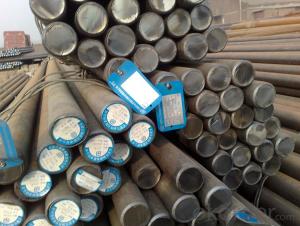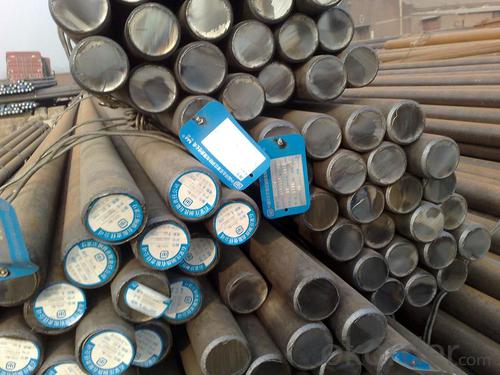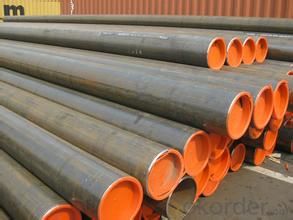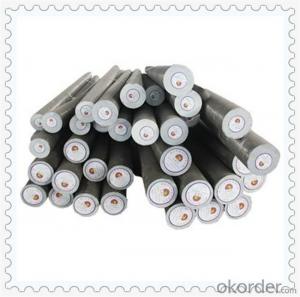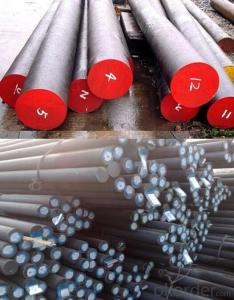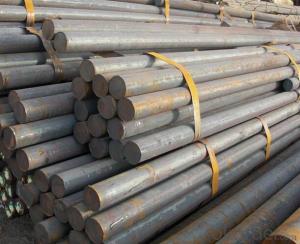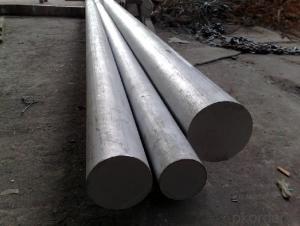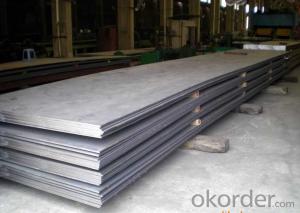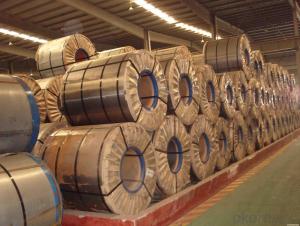Special Steel 1.6511 Alloy Structural Steel / 4340 Tool Steel
- Loading Port:
- China main port
- Payment Terms:
- TT or LC
- Min Order Qty:
- 25 m.t.
- Supply Capability:
- 10000 m.t./month
OKorder Service Pledge
OKorder Financial Service
You Might Also Like
Specification
The details of our Steel
1. Produce Standard: as the GB, AISI, ASTM, SAE, EN, BS, DIN, JIS Industry Standard
2. Produce processes: Smelt Iron -EAF smelt Billet - ESR smelt Billet -Hot rolled or forged get the steel round bar and plate
3. Heat treatment:
Normalized / Annealed / Quenched+Tempered
4. Quality assurance:
All order we can received Third party inspection, You can let SGS, BV,.. and others test company test and inspect our products before Goods shipping.
Product information
Chemical Composition(%) of 4340 tool steel | C | Si | Mn | S | P | Cr | Mo |
0.38-0.43 | ≤0.40 | 0.60-0.80 | ≤0.040 | ≤0.035 | 0.90-1.20 | 0.15-0.30 | |
Available Size of 4340 tool steel | Diameter(mm) | Length(mm) | |||||
10-300 | 2000-6000 | ||||||
Characteristics of 4340 tool steel | 1.high hardness 2.high tensile | ||||||
Application of 4340 tool steel | extrusion dies and die-casting for alumium, mandgnesium allay mostly, for copper alloy could use mechaincal press forhing of steel | ||||||
Heat Treatment of 4340 tool steel | 1. Forging:Heat slowly and uniformly to 1000°C. After forging cool slowly. 2. Annealing: 780-800°C slowly cooling | ||||||
Main product
Plastic Mould Steel
DIN 1.2311,1.2738,1.2083,1.2316 etc.
AISI P20,P20+Ni,420 etc.
JIS SUS420J2
Hot Work Steel
DIN 1.2344,1.2343,1.2367,1.2365,1.2581,1.2713 etc.
AISI H13,H11,H10,H21, etc.
JIS SKD61,SKD6,SKD5,SKT4 etc.
Cold Work Steel
DIN 1.2739, 1.2601, 1.2080, 1.2436, 1.2631, 1.263, 1.2510, 1.2327 etc.
AISI D2, D5, D3, D6, A8, A2, O1 etc.
JIS SKD10, SKD11, SKD1, SKS3 etc.
High Speed Steel
DIN 1.3343, 1.3243, 1.3247, 1.3355 etc.
AISI M2, M35, M42, T1 etc.
JIS SKH51, SKH35, SKH59, SKH2 etc.
Alloy Structural Steel
DIN 1.7035,1.6511,1.7220,1.7225 etc.
AISI 5140, 4340, 4135, 4140 etc.
JIS SCr440,SNCM439,SCM435,SCM440 etc.
Stainless & Carbon Steel or Others
DIN 1.4125,1.1191 etc
AISI 440C,1045, 1020 etc.
JIS SUS440C,S45C etc
Product show

Workshop show

Shipping
1. FedEx/DHL/UPS/TNT for samples, Door-to-Door;
2. By Air or by Sea for batch goods, for FCL; Airport/ Port receiving;
3. Customers specifying freight forwarders or negotiable shipping methods!
Delivery Time: 3-7 days for samples; 5-25 days for batch goods.
Payment Terms
1.Payment: T/T, L/C, Western Union, MoneyGram,PayPal; 30% deposits; 70% balance before delivery.
2.MOQ: 1pcs
3.Warranty : 3 years
4.Package Informations: 1) EXPORT, In 20 feet (GW 25 ton) or 40 feet Container (GW 25 ton)
2)as customer's requirement
Why choose us?
(1) The leading exporter in China special steel industry.
(2) Large stocks for various sizes, fast delivery date.
(3) Good business relationship with China famous factories.
(4) More than 7 years steel exporting experience.
(5) Good after-sales service guarantee.
- Q: What are the requirements for special steel used in pharmaceutical manufacturing?
- The requirements for special steel used in pharmaceutical manufacturing include high corrosion resistance, excellent cleanliness and hygiene, resistance to high temperatures and chemicals, and compliance with strict regulatory standards such as Good Manufacturing Practices (GMP). Additionally, the steel must be able to maintain the integrity of the pharmaceutical products, ensuring their purity and preventing contamination.
- Q: What are the different surface finishing techniques for special steel parts?
- There are several surface finishing techniques that can be used for special steel parts to enhance their appearance, protect them from corrosion, and improve their overall performance. Some of the commonly used techniques include: 1. Polishing: This technique involves using abrasives to create a smooth and glossy surface on the steel part. It not only enhances the aesthetic appeal but also improves the part's resistance to corrosion. 2. Plating: Plating is a process that involves depositing a layer of metal onto the surface of the steel part. Common plating options include chrome, nickel, and zinc. This technique provides additional protection against corrosion, improves wear resistance, and can also give the part a desired color or finish. 3. Powder coating: Powder coating is a method where a dry powder is applied to the surface of the steel part electrostatically and then cured under heat. The powder melts and forms a hard, durable, and attractive coating. This technique provides excellent resistance to corrosion, impact, and chemicals. 4. Anodizing: Anodizing is primarily used for aluminum, but it can also be applied to some special steel parts. It involves creating a controlled oxide layer on the surface of the part, which enhances its corrosion resistance, improves its appearance, and can provide an insulation layer. 5. Passivation: Passivation is a chemical process that removes free iron and other contaminants from the surface of the steel part. It helps prevent corrosion and improves the part's resistance to staining or discoloration. 6. Heat treatment: Heat treatment is a process that involves heating and cooling the steel part to alter its physical and mechanical properties. It can improve hardness, strength, and toughness, while also providing a desired surface finish. 7. Electropolishing: Electropolishing is an electrochemical process that removes a thin layer of metal from the surface of the steel part. It helps eliminate surface imperfections, smoothens the part, and improves its corrosion resistance. It is important to choose the appropriate surface finishing technique based on the specific requirements of the special steel part, such as its function, desired appearance, and environmental conditions it will be exposed to.
- Q: What are the main factors affecting the creep resistance of special steel?
- The main factors affecting the creep resistance of special steel are composition, microstructure, and processing conditions. Composition plays a critical role in determining the creep resistance of special steel. The presence of alloying elements such as chromium, molybdenum, and vanadium can enhance the creep resistance by forming stable precipitates or carbides that impede dislocation movement. These alloying elements also contribute to the formation of a protective oxide layer, which can further improve the resistance to creep. Microstructure is another important factor affecting creep resistance. Fine-grained structures, achieved through proper heat treatment or alloying, can hinder dislocation movement and enhance the strength of the material, thereby improving creep resistance. Additionally, the presence of grain boundaries can act as barriers to dislocation motion, reducing the creep rate. Processing conditions, including heat treatment and deformation processes, can significantly influence the creep resistance of special steel. The choice of heat treatment parameters, such as temperature and cooling rate, can affect the precipitation of strengthening phases and the formation of a desirable microstructure. Proper deformation processing, such as hot working or cold working, can refine the grain structure and enhance the creep resistance. Other factors that can affect the creep resistance of special steel include temperature, stress, and time. Higher temperatures can accelerate creep deformation, while higher applied stresses can increase the creep rate. The duration of exposure to elevated temperatures and stresses also plays a role, as prolonged exposure can lead to creep failure. In conclusion, the creep resistance of special steel is influenced by various factors, including composition, microstructure, processing conditions, temperature, stress, and time. By carefully considering and optimizing these factors, the creep resistance of special steel can be enhanced, making it suitable for high-temperature and long-term applications.
- Q: What are the applications of special steel in the automotive manufacturing process?
- Special steel has several applications in the automotive manufacturing process. It is commonly used in the production of engine components, such as crankshafts, camshafts, and connecting rods, due to its high strength and resistance to wear and tear. Special steel is also utilized in the manufacturing of suspension components, such as springs and shock absorbers, as it provides the necessary durability and resilience to withstand the constant stresses and strains of the vehicle's operation. Additionally, special steel is employed in the production of safety features, including seat belt pretensioners and airbag components, as it offers the required toughness and impact resistance. Overall, special steel plays a vital role in enhancing the performance, safety, and longevity of automotive vehicles.
- Q: What are the different magnetic grades of special steel?
- There are several different magnetic grades of special steel that are commonly used in various applications. Some of the most common magnetic grades include: 1. Soft Magnetic Materials: These grades of special steel are designed to have high magnetic permeability and low coercivity. They are used in applications where a high magnetic induction is required, such as in transformers, electric motors, and magnetic cores for electrical devices. 2. Martensitic Stainless Steels: These grades of special steel have a high magnetic permeability and are magnetic in their hardened state. They are commonly used in applications such as cutlery, tools, and certain automotive components. 3. Ferritic Stainless Steels: These grades of special steel have a lower magnetic permeability compared to martensitic stainless steels, but they are still magnetic. They are commonly used in applications such as automotive exhaust systems, decorative trim, and appliances. 4. Duplex Stainless Steels: These grades of special steel possess a mixed microstructure of austenite and ferrite, resulting in a magnetic response. They are known for their high corrosion resistance and are used in applications where both strength and corrosion resistance are required, such as in chemical processing equipment and offshore oil and gas platforms. 5. Austenitic Stainless Steels: These grades of special steel are non-magnetic in their annealed state. However, they can exhibit slight magnetism when cold worked or if they contain certain alloying elements. Austenitic stainless steels are widely used in various applications, such as in food processing equipment, architectural structures, and medical devices. It's important to note that the presence or absence of magnetism in special steel grades can vary depending on factors such as composition, heat treatment, and processing. Therefore, it is crucial to consider the specific requirements of a particular application when selecting the appropriate magnetic grade of special steel.
- Q: How is precipitation-hardening steel used in the aerospace industry?
- Precipitation-hardening steel is commonly used in the aerospace industry due to its exceptional strength-to-weight ratio and high corrosion resistance. This type of steel undergoes a specialized heat treatment process that allows for the precipitation of particles within its microstructure, resulting in improved mechanical properties. These steels are used in various components and structures of aircraft, such as landing gears, engine parts, and structural frames, where strength, durability, and weight savings are crucial factors for performance and safety.
- Q: What are the specific requirements for special steel used in the nuclear waste storage industry?
- The nuclear waste storage industry has stringent and critical requirements for special steel to guarantee the safety and long-term viability of storage facilities. These requirements are driven primarily by the need to mitigate risks associated with nuclear waste, such as radiation leakage and corrosion. One key requirement is the need for high strength and durability. Special steel used in nuclear waste storage must possess exceptional mechanical properties to withstand the weight and pressure exerted by waste containers and the surrounding environment. This includes resistance to deformation, fracture, and fatigue, as well as the ability to maintain structural integrity for an extended period. Another essential requirement is excellent corrosion resistance. Nuclear waste contains highly corrosive substances that can degrade regular steel over time. Therefore, special steel used in the nuclear waste storage industry must have enhanced corrosion resistance to ensure long-term durability and prevent leakage of radioactive materials. Furthermore, the steel must have a low susceptibility to stress corrosion cracking (SCC). SCC occurs when a combination of tensile stress, corrosive environment, and specific material conditions result in crack initiation and propagation. To maintain the integrity of containers and minimize the risk of leakage, the steel used must be highly resistant to SCC. Radiation resistance is also critical for special steel used in nuclear waste storage. The steel should exhibit minimal degradation or embrittlement when exposed to high levels of radiation. This is necessary to maintain the structural integrity of storage containers and prevent any weakening that could compromise waste containment. In addition, the special steel used in the nuclear waste storage industry must comply with strict regulatory standards and certifications. It must meet specific design codes and guidelines set by regulatory authorities to ensure compliance with safety regulations and minimize potential hazards. In conclusion, the special steel used in the nuclear waste storage industry must meet specific requirements, including high strength, durability, corrosion resistance, low susceptibility to stress corrosion cracking, radiation resistance, and compliance with regulatory standards. These requirements are essential for maintaining the safety and integrity of storage facilities and preventing any leakage or release of radioactive materials into the environment.
- Q: What are the requirements for special steel used in metalworking tools?
- To ensure the effectiveness and durability of metalworking tools, specific characteristics and qualities are necessary for the special steels used in their production. Key requirements for these steels include: 1. High hardness: The special steels must possess a high level of hardness to resist wear and deformation, enabling the tools to maintain their sharpness and cutting edge for extended periods. This results in efficient and precise machining operations. 2. Excellent toughness: Given the high impact and stress loads experienced by metalworking tools, they must have excellent toughness to withstand the forces encountered during cutting, drilling, or shaping operations. This toughness prevents the tools from fracturing or chipping, ensuring a longer tool life. 3. Good heat resistance: The performance of metalworking tools can be compromised by the significant heat generated during the machining process. Therefore, the special steels used in these tools should exhibit good heat resistance to minimize the risk of thermal damage, even at elevated temperatures. 4. Wear resistance: Metalworking tools are constantly in contact with the workpiece, making the ability to resist wear crucial. Special steels used in these tools should have high wear resistance to maintain their cutting performance and dimensional accuracy over time. 5. Corrosion resistance: Metalworking tools often encounter harsh environments with coolants, lubricants, and corrosive elements. To prevent rusting and degradation, the special steels used in these tools should possess good corrosion resistance, ensuring the longevity and reliability of the tools. 6. High dimensional stability: Special steels used in metalworking tools must exhibit high dimensional stability to guarantee consistent performance. This stability allows the tools to maintain their shape and size under varying operating conditions, resulting in accurate and repeatable machining processes. 7. Machinability: The special steels used in metalworking tools should be easily processed and shaped into the desired tool design. This characteristic enables cost-effective manufacturing, reducing production time and expenses. By meeting these requirements, the special steels used in metalworking tools can withstand the demanding conditions encountered in various metal fabrication and machining operations. They provide efficient cutting, shaping, and drilling capabilities while maintaining longevity and performance.
- Q: What are the common alloying elements in special steel?
- The common alloying elements in special steel are chromium, manganese, molybdenum, nickel, and vanadium.
- Q: How does special steel contribute to the manufacturing of valves and pumps?
- The manufacturing of valves and pumps heavily relies on special steel, which possesses exceptional strength, durability, and corrosion resistance properties. These properties make it highly suitable for these critical components. Valves and pumps play a vital role in various industrial processes, including oil and gas, chemical, and power generation industries. Their function is to control the flow of fluids or gases, ensuring efficient and safe operations. Special steel is used in these applications due to its ability to withstand extreme pressure, high temperatures, and aggressive chemicals. One of the primary advantages of special steel in valve and pump manufacturing is its strength. These components often operate under immense pressure, and ordinary steel may not possess the necessary strength to withstand these conditions. In contrast, special steel has enhanced tensile strength, enabling valves and pumps to endure high-pressure environments without deforming or failing. Corrosion resistance is another crucial aspect of special steel. Valves and pumps frequently come into contact with corrosive substances, such as saltwater, acids, or chemicals. Special steel is engineered to resist corrosion, preventing the degradation of these components and ensuring their longevity. By utilizing special steel, manufacturers can create valves and pumps that can withstand harsh environments and corrosive substances, reducing maintenance costs and downtime. Additionally, special steel offers excellent durability, which is essential for valves and pumps that need to operate continuously for extended periods. These components experience constant wear and tear due to fluid flow and pressure fluctuations. Special steel's resistance to fatigue and wear ensures that valves and pumps can function reliably and efficiently over time, minimizing the risk of breakdowns and extending the equipment's lifespan. In conclusion, special steel is indispensable in valve and pump manufacturing. Its exceptional strength, corrosion resistance, and durability properties make it an ideal material for these critical components. By utilizing special steel, manufacturers can produce valves and pumps that can withstand extreme conditions, resist corrosion, and operate reliably, contributing to safer and more efficient industrial processes.
Send your message to us
Special Steel 1.6511 Alloy Structural Steel / 4340 Tool Steel
- Loading Port:
- China main port
- Payment Terms:
- TT or LC
- Min Order Qty:
- 25 m.t.
- Supply Capability:
- 10000 m.t./month
OKorder Service Pledge
OKorder Financial Service
Similar products
Hot products
Hot Searches
Related keywords
